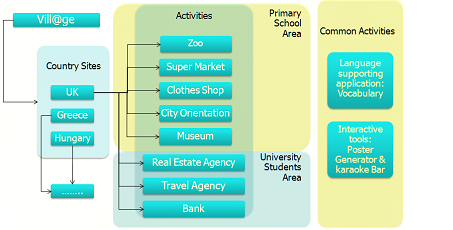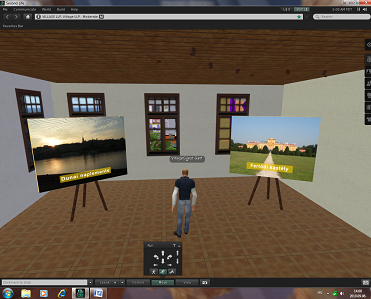X. 3. Working with texts. The Vill@ge project
The Vill@ge project
Many projects have long titles. This is why for ’project speak’ and making references easily, project participants use acronyms (abbreviation formed from the components of a word or phrase) instead. The acronym ’Vill@ge’ means: A VIrtual world for entertaining Language Learning Among younG Europeans.
This project was an international on-line project, offering virtual language learning opportunities through edutainment activities. Edutainment is a new concept in teaching. The word itself has been put together from the words ’education’ and ’entertainment’. Consequently, it means to teach in an entertaining way. In the Vill@ge project the form of education was entertainment (using a virtual world), and its content was learning to communicate in English in everyday situations.
The project consortium consisted of a technical developer, a Greek IT company from Athens, two universities, The University of Szeged, Hungary and Swansea University, Wales (UK), and three primary schools, one from Szeged, one from Athens and one from Swansea.
First teaching materials were developed. The technical developers created an ’island’ in Second Life, a free, 3D virtual world, where participating students and primary school children were able to meet each other in a virtual England, Greece, or Hungary. They could visit places with their avatars, have discussions or, do activities together.
Project work in Vill@ge included prototype evaluation, pilot sessions and regular monitoring and evaluations. Primary school learners (from grades 5 and 6) and university students (from the banking and finance and the teacher training programmes) ’met’ their counterparts and did activites with them on a weekly basis for a period of 6 weeks.
The gains of the Vill@ge project were:
- Extensive language usage
- Native-non-native interaction
- Awareness of different cultures and languages
- Natural and useful situations for communication
- Confidence to learn and use foreign languages
- Joy of learning and doing things with the language
- Vocabulary gain
Natural intonation, naturally quick response.
Below you can see the layout of the island.
Task
What activities would you design for your language learners?

Task
In each of the three ’virtual’ countries there was a museum, too, with pictures and artifacts, typical of that particular country.
’Collect’ 10 pictures/objects you would like to exhibit in the Hungarian section of the museum.
